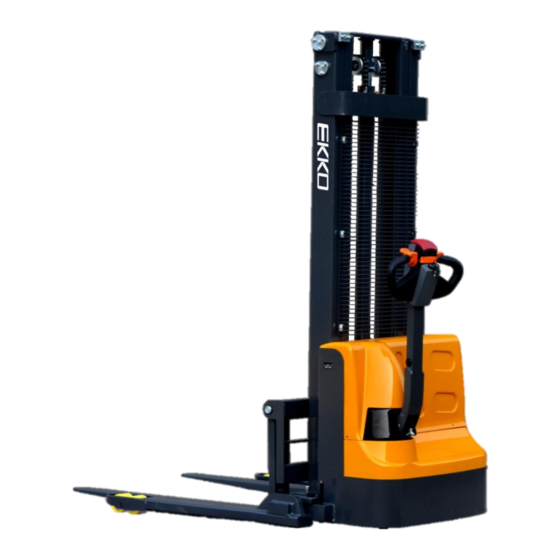Summary of Contents for EKKO EB12E Series
- Page 1 The Specification EB12E Series Full Electric Straddle Stacker Note: Before using, please read this manual! - 1 - - 1 -...
-
Page 2: Table Of Contents
EKKO Material Handling Equipment Manufacturing, Inc. Contents 1. The correct use of Electric stacker ..........- 3 - 2. Warning,the residual risk and safety instructions ....... - 7 - 3. Commissioning, transport, outage ..........- 8 - 4. Daily inspection ................- 9 - 5. -
Page 3: The Correct Use Of Electric Stacker
1. The correct use of electric stacker Described in this manual of the full electric walkie straddle stacker. This equipment is to reduce the handling and transportation of your load efficiently. Improper use may result in personal injury or damage of the machine. The operator must ensure proper usage and be authorized and trained before use. - Page 4 Model EB12E Load capacity (lbs) 2640 Load capacity on Max. height (kg) (lbs) 1540 The max. lifting height (in) 119.4 Load center distance (in) Fork length (in) Single fork width (in) Overall fork width (in) 8.3-33.5 Lowered fork height (in) 2.35 Fixed leg length (in)
- Page 5 1.3 Optional C. Safety devices and warning label, description A The hook label B The warning label: Do not stand at the fork below or the goods fork C Load curve icon paste D Read and observe the instructions of the label - 5 - - 5 -...
- Page 6 E Data plate (3) The emergency stop switch (14) Belly switch The stacker has an emergency stop switch that stops all functions, lifting and driving functions, and can make the electromagnetic brake engage. After checking everything and it is safe to do so, pull the red emergency switch back up to engage all functions.
- Page 7 D. Data plate 1 Name, type 7 Minimum / maximum battery weight 2 Serial number 8 Rated power (kW) 3 Rated capacity (ib) 9 Load center distance 4 Supply voltage (V) 10 Manufacturing parameters 5 No battery weight (weight) (ib) 11 Optional 6 The name and address of manufacturer 2.Warning, safety instructions...
- Page 8 7. Be cautious while operating this on a slope. Sudden movement may cause unexpected stability of the load. 3. Inspection, transport, outage 3.1 Test Inspecting on receipt of your new stacker, the following steps before operating the equipment: The equipment should be at full charge. (see Chapter sixth) Work according to the inspection and routine inspection of the equipment.
-
Page 9: Daily Inspection
Transport: A. In the process of transportation vehicles must be firmly fixed on truck. B. Reduce the fork to the lowest position. Use straps through or on the outriggers/leg 4. Daily inspection This chapter describes the daily inspection of the equipment and recommended examination before operation. - Page 10 5.1 Parking Not recommended to stop on a slope. This car is equipped with an electromagnetic fault protection parking and parking brake. However, please always completely lower the fork at all times. Turn key counterclockwise rotation, then remove the key. 5.2 Load Curve Load curve shows a given load center C [mm] and horizontal load capacity of the largest load Q [kg] vehicle corresponding lifting height is H [mm].
- Page 11 Fig 7: Goods Up Turn on the equipment with key, pull the emergency button switch upward if not engaged. Raise the forks at a minimum height of at least 3-6 inches off the ground to avoid getting caught up on anything (Figure 11) Carefully accelerator butterfly throttle on the handle to determine if you are moving forward or backwards.
-
Page 12: Battery Charging And Replacement
5.7. Brake Load braking performance depends on the road conditions and equipment. Brake function can be activated by the following ways through the accelerator button (12) moved back to '0' position or the release of this button, the regenerative braking is activated. Through the accelerator button (12) driving direction move directly to the opposite direction from a truck with regenerative braking, until it begins running in the opposite direction. -
Page 13: Regular Maintenance
Safety park vehicles, with a key (16) close the stacker and press the emergency stop switch (2). Unscrew the 2 screws on the main cover, remove the main outer cover. First unscrew the 6.2. Power Meter Discharge with 4 LED display to show 6.3. - Page 14 If you need to replace the wheel, please follow the above instructions. Caster must be and no abnormal wear round. Check and maintain the list of items on the list. 7.1. Maintain inventory Table4: Maintain inventory The interval of time (month) Check the hydraulic oil cylinder, for noise and leakage ●...
- Page 15 Brake system Check the brake performance, brake disc replacement or ● adjustment gap if necessary Battery ● Check the battery voltage ● Clean and give the terminal grease, check whether there is corrosion and damage ● Check the battery shell is damaged Charger ●...
- Page 16 1. The wheel bearing 2. The door frame 3. Chain 4. Hydraulic system 5. Steering bearing 6. Gear box 7.3. Inspection and hydraulic oil refill needed hydraulic oil type Anti-wear hydraulic oil 32# Viscosity is 32 - 38 Based on the model, the amount of oil is from ~2.5L to 3.0L. Waste materials such as waste oil, waste batteries or other materials must be recycled according to law.
-
Page 17: Fault Analysis
and then tighten screws. If you need to change parts, please contact your nearest after sale service dealer. 8. Fault analysis If the truck after to following the instructions of the chapter (6) is still at cause of functioning. Table Failure analysis of 6: Fault Reason Repair...









Need help?
Do you have a question about the EB12E Series and is the answer not in the manual?
Questions and answers